
by Adelle M. Banks, RNS | Sep 29, 2020 | Headline News |
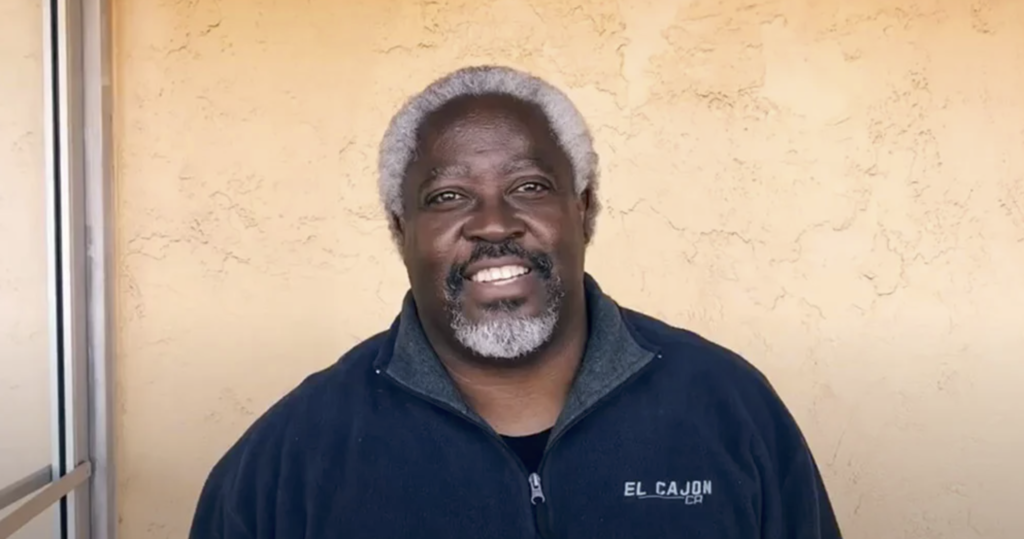
The Rev. Rolland Slade in October 2018. Video screengrab
In his first meeting as leader of the Southern Baptist Convention Executive Committee, the Rev. Rolland Slade called on other committee members on Tuesday (Sept. 22) to be responsible “to shepherd and to protect” survivors of church sex abuse.
Slade, senior pastor of Meridian Baptist Church in El Cajon, California, announced that the issue is “personal” for him because his wife is a survivor.
“For the last 40 years of my life, I have been in touch with a survivor of sexual abuse in the church,” he said to the 70 people attending the virtual meeting. “In fact, we’ve been married 39 years. So when I say it’s personal, it’s personal. And I encourage you to listen. You don’t have to solve it but you need to listen and share with them how much you care and what has happened to them is not what God would have happen in the church.”
Slade was elected in June as the first African American chair of the committee that runs the business of the nation’s largest Protestant denomination between its annual meetings.
The issue of sexual abuse has been a growing focus of the denomination, the country’s second largest Christian group, but has been particularly pressing since a series in the Houston Chronicle last year cataloged some 700 cases of alleged abuse by Southern Baptist pastors and other leaders over two decades. Mike Stone, the committee’s previous chairman, began a meeting of the group last year by displaying a photo of himself as a young child and sharing that he had been abused as a boy.
At the 2019 SBC annual meeting, Southern Baptists approved a new credentials committee that can recommend the disaffiliation of churches that do not properly handle instances of abuse. In February, the Executive Committee removed a Texas church that had employed a pastor who was a registered sex offender.
Jon Wilke, media relations director for the Executive Committee, told Religion News Service before Tuesday’s meeting that the credentials committee “continues to meet virtually and work on churches submitted for disfellowship.” He said the committee will not bring any new recommendations to the full Executive Committee until after it meets in person again, tentatively set for February.
SBC President J.D. Greear, one of the speakers at the Tuesday meeting, echoed Slade’s remarks on supporting abuse survivors as one of the numerous ways the Southern Baptists should focus on describing themselves as “Great Commission Baptists,” a reference to Jesus’ command to spread his message globally that is a theme of the next annual meeting.
“Our focus on the Great Commission is why we will continue to strive to make the most vulnerable in our churches — specifically victims of sexual abuse — feel safe by showing them that we will do everything in our power to keep our churches safe from abuse and safe for the abused,” Greear said.
“That’s not something we do because it’s in the media. It’s not something we do because it’s trendy,” he added.
“We do that because it’s right and because Jesus died for those that were vulnerable and said it’d be better if a millstone were hung about our neck and cast into the sea than to cause one of the little ones to believe and then to stumble.”
Slade listed abuse survivors as the second of two groups he believed his committee should give particular attention. The other is pastors of the relatively small churches that comprise the bulk of congregations affiliated with the evangelical denomination.
“I respect wholeheartedly pastors who have pastored megachurches and have great testimony of the thousands that they reach each and every week,” said Slade. “But I want to remind us that of our denomination of 48,000 churches, there are more churches that are normative size,” he said, referring to churches with Sunday attendance of fewer than 100 people.
Slade offered his own church as an example. “Meridian Baptist Church runs a little over a hundred on a really good Sunday when we count everybody who steps on the property,” he said.
Slade expressed his wish that the men who lead these congregations — often working in additional jobs and giving a portion of their salaries to support the SBC budget — should be connected with megachurch pastors and church planters, who start new congregations.

by Adelle M. Banks, RNS | Sep 27, 2020 | Headline News |

The Rev. Rolland Slade in October 2018. Video screengrab
In his first meeting as leader of the Southern Baptist Convention Executive Committee, the Rev. Rolland Slade called on other committee members on Tuesday (Sept. 22) to be responsible “to shepherd and to protect” survivors of church sex abuse.
Slade, senior pastor of Meridian Baptist Church in El Cajon, California, announced that the issue is “personal” for him because his wife is a survivor.
“For the last 40 years of my life, I have been in touch with a survivor of sexual abuse in the church,” he said to the 70 people attending the virtual meeting. “In fact, we’ve been married 39 years. So when I say it’s personal, it’s personal. And I encourage you to listen. You don’t have to solve it but you need to listen and share with them how much you care and what has happened to them is not what God would have happen in the church.”
Slade was elected in June as the first African American chair of the committee that runs the business of the nation’s largest Protestant denomination between its annual meetings.
The issue of sexual abuse has been a growing focus of the denomination, the country’s second largest Christian group, but has been particularly pressing since a series in the Houston Chronicle last year cataloged some 700 cases of alleged abuse by Southern Baptist pastors and other leaders over two decades. Mike Stone, the committee’s previous chairman, began a meeting of the group last year by displaying a photo of himself as a young child and sharing that he had been abused as a boy.
At the 2019 SBC annual meeting, Southern Baptists approved a new credentials committee that can recommend the disaffiliation of churches that do not properly handle instances of abuse. In February, the Executive Committee removed a Texas church that had employed a pastor who was a registered sex offender.
Jon Wilke, media relations director for the Executive Committee, told Religion News Service before Tuesday’s meeting that the credentials committee “continues to meet virtually and work on churches submitted for disfellowship.” He said the committee will not bring any new recommendations to the full Executive Committee until after it meets in person again, tentatively set for February.
SBC President J.D. Greear, one of the speakers at the Tuesday meeting, echoed Slade’s remarks on supporting abuse survivors as one of the numerous ways the Southern Baptists should focus on describing themselves as “Great Commission Baptists,” a reference to Jesus’ command to spread his message globally that is a theme of the next annual meeting.
“Our focus on the Great Commission is why we will continue to strive to make the most vulnerable in our churches — specifically victims of sexual abuse — feel safe by showing them that we will do everything in our power to keep our churches safe from abuse and safe for the abused,” Greear said.
“That’s not something we do because it’s in the media. It’s not something we do because it’s trendy,” he added.
“We do that because it’s right and because Jesus died for those that were vulnerable and said it’d be better if a millstone were hung about our neck and cast into the sea than to cause one of the little ones to believe and then to stumble.”
Slade listed abuse survivors as the second of two groups he believed his committee should give particular attention. The other is pastors of the relatively small churches that comprise the bulk of congregations affiliated with the evangelical denomination.
“I respect wholeheartedly pastors who have pastored megachurches and have great testimony of the thousands that they reach each and every week,” said Slade. “But I want to remind us that of our denomination of 48,000 churches, there are more churches that are normative size,” he said, referring to churches with Sunday attendance of fewer than 100 people.
Slade offered his own church as an example. “Meridian Baptist Church runs a little over a hundred on a really good Sunday when we count everybody who steps on the property,” he said.
Slade expressed his wish that the men who lead these congregations — often working in additional jobs and giving a portion of their salaries to support the SBC budget — should be connected with megachurch pastors and church planters, who start new congregations.
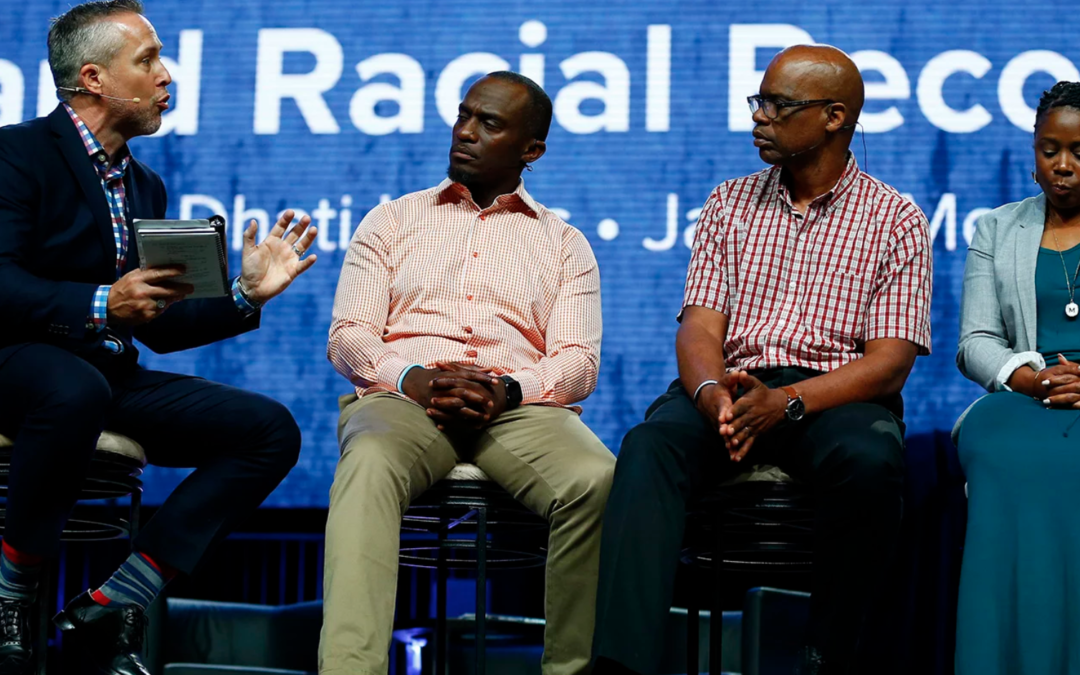
by Adelle M. Banks, RNS | Jun 17, 2019 | Headline News |
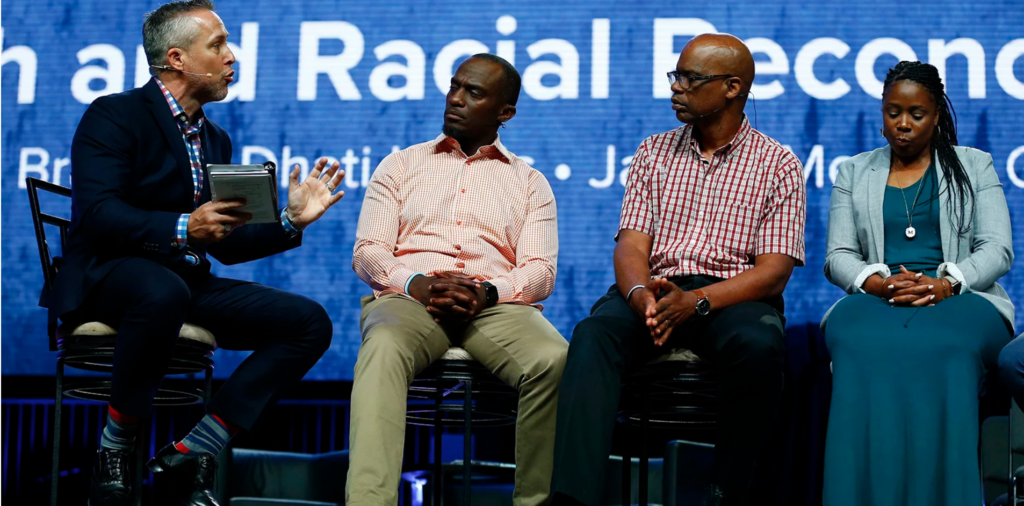
SBC President J.D. Greear speaks on a panel discussion about racial reconciliation during the annual meeting of the Southern Baptist Convention at the BJCC, June 11, 2019 in Birmingham, Ala. RNS photo by Butch Dill.
At their annual meeting, Southern Baptists re-elected their president, adopted statements on their views about major cultural issues, and discussed how to deal with sexual abuse and racial discrimination in the church.
They also brought to center stage questions about church leadership roles that are appropriate for women in the church.
North Carolina pastor J.D. Greear, who was elected Tuesday (June 11) to a second one-year term as president, had emphasized a “Gospel Above All” theme for the meeting. He said that message was linked to multicultural worship music throughout the meeting and the inclusive approach Baptists took in appointing leaders to the convention’s various committees.
“We’re not where we need to be on those things, but I believe a signal has been sent that we believe that’s where we need to go,” he said at a news conference at the conclusion of the meeting on Wednesday.
“Now it’s on us to take the right steps at the right time and to move in a way that shows that it’s not words or virtue signaling but it’s something that we mean because we believe the Bible teaches it.”
Southern Baptist Theological Seminary President R. Albert Mohler Jr. said that in the past, issues of diversity were usually discussed mostly in hallways among small groups of church delegates, known as messengers. At this meeting, the conversations were held on the main stage of the gathering, which drew more than 8,000 messengers.
A Wednesday panel discussion on the value of women talked about whether a woman could be pastor (no, since the SBC’s doctrine limits that role to men) and whether a woman could one day become a president of the Southern Baptist Convention (maybe, since nothing in the SBC’s governing documents precludes women from that role).
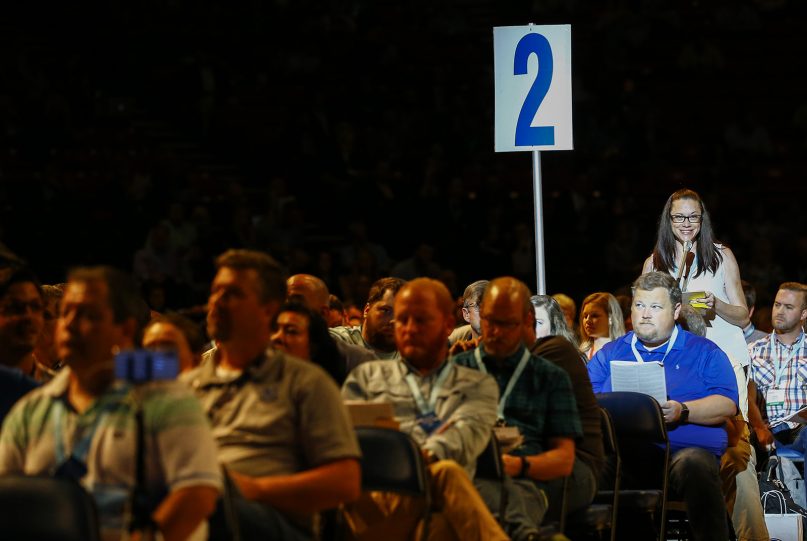
A messenger speaks to a motion during the annual meeting of the Southern Baptist Convention at the BJCC, June 12, 2019 in Birmingham, Ala. (RNS Photo/Butch Dill)
Panelists in a Tuesday discussion on racial reconciliation addressed how the issue affects both local congregations and the larger church. A pastor on the panel mentioned how a church member left his congregation when the congregant disagreed with the minister’s support of Baptists’ vote several years ago to repudiate the Confederate flag. Another mentioned how people of color are not likely to get to executive meeting rooms until they are in the same dining rooms with influential white leaders.
“It was definitely a different convention,” said Mohler. “There were more women’s voices and, by intentionality, more voices from African Americans and others who we very much want to be a part of the future of the Southern Baptist Convention.”
Pastor Dwight McKissic, a Texas minister who has advocated for more minorities and women to be placed in positions of leadership, agreed the issue of inclusion was highlighted at the meeting.
“It was clearly a move in that direction, stronger than I’ve ever seen, and I welcomed it and celebrate it,” he said.
Still, McKissic was concerned about a lack of diversity in the leadership of major Southern Baptist entities. He noted that the trustee chairman of New Orleans Baptist Theological Seminary told messengers the search committee had considered several minority candidates when hiring a new president. But McKissic was disappointed that the board chair of the Executive Committee declined to be as forthcoming about details of its recent hiring process for a new president.
RELATED: Southern Baptist historic gavel a reminder of racist legacy
Abuse victim advocates noted the many actions Southern Baptists took on the abuse issue — including the introduction of “Caring Well” handbooks and video resources. But they still urged the convention to set up a database to help track abusers and keep them from moving from church to church.
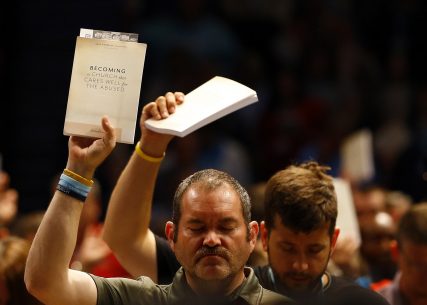
Messengers hold up an SBC abuse handbook while taking a challenge to stop sexual abuse during the annual meeting of the Southern Baptist Convention at the BJCC, June 12, 2019, in Birmingham, Ala. RNS photo by Butch Dill
“A clergy database must be established, documenting confessed, convicted or credibly accused abusers,” said advocate Cheryl Summers at a rally she organized outside the Birmingham-Jefferson Convention Complex on Tuesday. “We have seen some progress, but there is a lot more work to be done.”
On Wednesday, Baptists also passed resolutions, nonbinding statements that give a sense of the views of those gathered for the annual meeting. They included:
- Urging the Supreme Court to overturn the 1973 Roe v. Wade decision that legalized abortion and celebrating “recent bipartisan gains in state legislatures that restrict abortion.”
- Calling the U.S. government to make religious liberty “a top priority of American foreign policy in its engagement with North Korea and China.”
- Recognizing critical race theory and intersectionality as “analytical tools” but repudiating their misuse.
- Urging the president and Congress to not include women in the Selective Service military registration, “which would be to act against the plain testimony of Scripture and nature.”
- Affirming their “commitment to Christ comes before commitment to any political party.”
by Christine A. Scheller | Jun 19, 2012 | Feature, Headline News |

HISTORIC ELECTION: Rev. Fred Luter has been elected as president of Southern Baptist Convention.
This afternoon, in a move that has been anticipated for at least a year, the Southern Baptist Convention elected the Rev. Fred Luter Jr. as its new president. Luter, the 55-year-old pastor of Franklin Avenue Baptist Church in New Orleans and first vice president of the SBC, will be the first African American to head the denomination, which was founded in defense of slavery in 1845.
In a rousing nomination speech, the Rev. Dr. David Crosby, senior pastor of First Baptist Church of New Orleans, said Luter is “qualified in every way to hold this office.” Crosby described Luter as a “man of integrity” who has a “loving family” and an “unblemished, untarnished reputation” in his community. Crosby also said Luter “would likely be a candidate for sainthood one day if he were a Catholic.” The men got to know each other after Hurricane Katrina when they shared worship space and did ministry together, he said.
Because Luter ran unopposed and because of the historic nature of his election, all convention “messengers” were asked to rise to affirm his nomination, which they did. Wiping away tears, Luter simply said, “To God be the glory for the things he has done. God Bless you. I love you.”
The New York Times reported that there are “51,000 congregations with 16 million members” in the SBC. “Luter shares the Baptists’ firm rejection of abortion and same-sex marriage, but he preaches more about personal salvation than politics. Though he never completed seminary training, he is renowned for his rapid-fire sermons filled with wordplay and hypnotic repetition,” the article said. Luter told The Times that his first priorities will be “the traditional Baptist goals of evangelizing, serving believers and providing disaster relief,” but that he would “use his power of appointments to get more minorities on the governing boards.”
The Rev. Dr. Dwight McKissic, senior pastor Cornerstone Baptist Church in Arlington, Texas, first advanced Luter for the presidency in 2010, according to an Associated Baptist Press article published earlier this year. Today, McKissic told UrbanFaith he thinks Luter’s election signals that the SBC wants to send a message that the denomination is ready to welcome African Americans.
“The next step I believe will be a real position of power in the Southern Baptist Convention. Unfortunately the president of the convention controls no budget, no personnel. It has influence, but it has no real inherent authority or power. … The jury is still out, but we’ll see when they get ready to hire an entity head whether or not they’re serious,” said McKissic.
“Symbolism has the capacity to make folks feel good about themselves without actually doing anything,” Robert Parham, executive director of Baptist Center for Ethics and EthicsDaily.com told USA Today.
“It is symbolism, but it’s major symbolism in the right direction that will open the door for full inclusion and empowerment of African Americans in the Southern Baptist Convention,” countered McKissic. Last year McKissic published two blog posts about egregious racism in SBC churches. UrbanFaith asked him if there has been any improvement in the situation since then. “The jury is out. Only time will tell. I don’t take this move to say that there is,” he said.
“This is not some tokenism. It’s symbolism with substance,” said Dr. Robert Smith, professor of divinity and Christian preaching at Beeson Divinity School in Birmingham, Alabama. Smith spoke to UrbanFaith this morning. “Fred Luter pastors Franklin Avenue Baptist Church, which is the largest Southern Baptist Church in terms of membership in the entire state of Louisiana. … He is greatly beloved and appreciated—the keyword is respected—by the convention. Otherwise he wouldn’t be elected,” added Smith.
After Luter’s election, UrbanFaith talked to Parham about Smith and McKissic’s responses to his USA Today quote. “Southern Baptists sought for decades to address the issue of racism with symbolic acts, such as pulpit swaps with African-American Baptist pastors. That symbolism of racial reconciliation was encouraging and positive,” Parham said. “When the white power structure in those pews sought to maintain economic privilege and maintain racial inequality, then the symbolism of pulpit swaps was often of little earthly good. … A lot of folks, including those in the national media, are reacting to the election as if it represented immediate, substantive transformation. Casting a single ballot is not the same thing as denominational reformation.” Still, Parham, like many others, tweeted his congratulations to Luter.
Quoting French author Victor Hugo, Smith said, “There’s nothing so powerful as an idea whose time has come. [Luter’s] time has come. It’s the right time. … He’s a middle of the way kind of person, aggressive with tenderness and mercy and patience. Things will not be changed overnight. …. I think he is the kind of person who is willing to see it through and waiting to see it through.”
“He will not be a black president. He will be a president black. What I mean by that is that if you say ‘black president,’ that means black is the adjective, which, in a way, modifies his presidency. No, he will be a president who just happens to be black. So it’s the presidency that is crucial and blackness happens to be who he is ethnically, but he’s been called to be president of the entire convention,” said Smith.
He also said it should be noted that “Fred really is not Fred without [his wife] Elizabeth.” “He has such great love for her and she has great love for him that they have a duel ministry and she will bolster his ministry in a tremendous way, because she has the same ideals.” Elizabeth Luter has spoken to “many of the great Southern Baptist churches” with white congregations, Smith said. “She is a mediating presence as well and has the ability to mix and mingle with different people and to love them as people and to not have a prejducial regard.”
Smith and McKissic were in New Orleans for the SBC annual meeting. Smith described the atmosphere this morning as “placid, peaceful, and anticipatory.” He said he overheard white men and women talking about “how wonderful it is” that Luter would be elected. “Everyone is standing on tip-toe anticipation, expecting it, and many are saying it’s a long time coming and should have been sooner,” said Smith.
It seemed few African Americans were tweeting with the convention hashtags #SBC12 and #SBC2012 throughout the day, and Dr. Nathan Finn, associate professor of historical theology and Baptist studies at Southeastern Baptist Theological Seminary, tweeted that “The #SBC12 is still a sea of white faces.” However, Smith said he saw “pockets of African Americans” at the convention, including a large contingent from the National African American Fellowship. This group will host a banquet tonight in honor of Luter’s election, he said.
McKissic may be cautiously optimistic about the significance of Luter’s ascendency, but he put forward three race-related resolutions that he said will be voted on tomorrow. One opposes connecting same sex marriage to the civil rights movement; another denounces racism in Mormon source documents; the third seeks recognition of Baptist minister George Liele as America’s first missionary.
The “skuttlebut” is that the first and third resolutions will pass, but that the Mormon one will not, McKissic said. “For some reason, the Southern Baptist Convention is declining to carry that resolution forward. I’m amazed by that,” he said.
He put forth the resolution regarding George Liele, a former slave who became a missionary to Jamaica, to “correct historical error,” he said. “They were not telling us the truth to say [Adoniram and Ann Judson] were the first missionaries.” Leile embarked in 1782, while the Judsons left for Burma in 1812, his resolution says. “I thought it would also be great in the year of Fred Luter that they are bookends, so to speak,” McKissic said.
“We need to look back and recognize the George Lieles … and other people like that who’ve paved the way so that we can rejoice over what God is doing and not forget about the individuals who have gone through the struggles and walked the stony road and shed the tears that we might enjoy what [has happened] today,” said Smith.
by Christine A. Scheller | Jun 4, 2012 | Entertainment, Feature, Headline News |

REPRIMANDED: Southern Baptist ethicist Richard Land will lose his radio show. (Photo: Baptist Press News)
Southern Baptist Ethics & Religious Liberty Commission President Richard Land has been reprimanded and will lose his radio show, the commission’s executive trustee committee announced in a statement to Baptist Press Friday.
Land was reprimanded for his “hurtful, irresponsible, insensitive, and racially charged words on March 31, 2012 regarding the Trayvon Martin tragedy.” In a radio broadcast that day, Land accused President Obama of “aiding and abetting” “race hustlers” in fomenting violence in response to the Martin shooting.
“We are particularly disappointed in Dr. Land’s words because they do not accurately reflect the body of his work over a long career at the ERLC toward racial reconciliation in the Southern Baptist Convention and American life,” the committee’s statement said.
Land was also reprimanded for “quoting material without giving attribution on the Richard Land Live! (RLL) radio show, thereby unwisely accepting practices that occur in the radio industry.” That material was taken directly from a Washington Times column. As a result, RLL will be terminated as soon as its contracts with the Salem Radio Network allow, the statement said.
In his own statement, Land affirmed the committee’s work, saying “I believe in trustee oversight and governance. I am under the authority of the trustees elected by the Southern Baptist Convention. This whole process was conducted in a Christian manner by Christian gentlemen.”
Land Shouldn’t be Driven from the Public Square
At The Huffington Post, Mark Joseph, author of The Lion, the Professor, and the Movies: Narnia’s Journey to the Big Screen, praised the embattled leader, saying, “If Land is driven from the public square it will be a sad day for the Christian community which sorely lacks smart spokespeople who can tell the rest of the country what’s on its mind.”
Land Should Be Fired as SBC’s Chief Ethicist
At Patheos.com’s “The Friendly Atheist,” Mark Turner noted that “despite calls from several Baptist ministers for Land to step down, he has not lost the post which would seem most inappropriate to retain — his job as president of the Ethics and Religious Liberty Commission.”
Land Is ‘a Study in Contradictions’
In a May 28 profile of Land at The Tennessean, Bob Smietana described him as “a study in contradictions,” saying Land is the son of a welder with a doctorate from Oxford University, a man who believes wives should obey their husbands, but who is married to an educated professional woman, and an opponent of gay marriage and abortion who supports immigration reform.
Land’s Legacy Is Unlikely to Outlive Luter’s
At Christianity Today, Bobby Ross Jr. compared Land’s downfall with the rise of the Rev. Fred Luter, who is expected to become the first African American president of the Southern Baptist Convention later this month. “Over the long haul, Luter’s election will have a more lasting influence upon the SBC” and “Land’s comments will be a historical footnote,” Nathan Finn, a professor of historical theology and Baptist studies at Southeastern Baptist Theological Seminary in North Carolina is quoted as saying.
Update: Land signed off from his radio show for the last time June 2, Associated Baptist Press reports. Without discussing the controversy surrounding his departure, Land reportedly said, “Due to a variety of circumstances this will be my last appearance on Richard Land Live!”
What do you think?
Should Land be fired as president of the SBC’s Ethics & Religious Liberty Commission or has he been sufficiently reprimanded?








